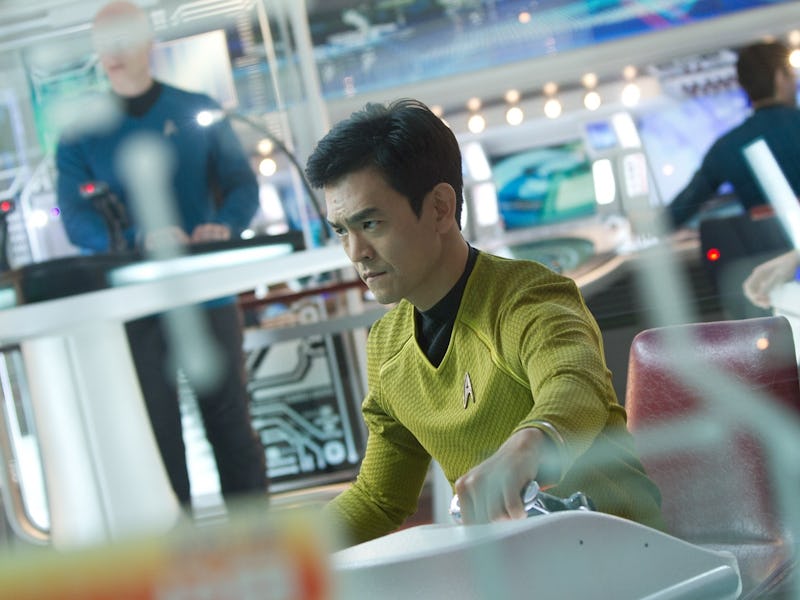Finally: John Cho Says Sulu is Gay in 'Star Trek Beyond'
It's been a long time coming, but Mr. Sulu has finally come out.

For 50 years, Star Trek has been lauded for providing a fictional futuristic context for an open-minded, unprejudiced, and inclusive vision of what the world could become. By breaking racial and gender boundaries in popular television (and films) you could call Star Trek the “We Are the World” of science fiction. Except for that embarrassing fact the show or films never explicitly depicted any of its characters to be gay. That is, until now.
Speaking to the Herald Sun, John Cho – the incumbent actor portraying Sulu, a role originated by George Takei – revealed his character will be gay in the new film, Star Trek Beyond.
Cho mentioned that the approach was to “not make a big thing of it,” and yet, this is a big deal – as Star Trek as an entity should have done this ages ago.
To be sure, hardcore Trekkies who have always loved Star Trek for its progressive story lines have a cause to celebrate: not only will Cho’s Sulu be depicted as having a husband, but also a daughter who is in a same-sex relationship. Overtly, all of this can scan as a tip-of-the-hat to George Takei, the original Sulu, who came out publicly in 2005, and quickly became an icon for gay rights, and thoughtful humanism in general. (Just watch To Be Takei if you haven’t). In a way, Takei sort of co-opted the “live long and prosper” salute as something of a LGBTQ message: living long and prospering also means equal rights for everyone. So, it’s only fitting that Takei’s character (now played by Cho) should come out in the fictional world of Star Trek, too.
A Few False Starts Up to Now:
In the past five decades, there have been a few false-starts to representing homosexuality in Trek’s 22nd, 23rd, and 24th centuries.
- During the Next Generation era, long-time Trek contributor David Gerrold submitted a script called “Blood & Fire,” which not only featured an openly gay couple on the Enterprise, but also futuristic social commentary about AIDS. The script was never filmed, but was adapted into a fan film episode of the same name in 2008.
"Rejoined"
- In 1995, Star Trek: Deep Space Nine featured Trek’s first same-sex kiss in an episode called “Rejoined” in which Jadzia Dax is reunited with a former flame. But, for many, this episode was seen as a cop-out, Jadzia only kisses another woman because the woman, was actually a man in a former life. Neither character were explicitly gay, or bisexual, making the progressiveness, and riskiness of the episode dubious.
- Similarly, the 1992 episode of Star Trek: The Next Generation titled “The Outcast,” depicted an alien race without any conception of gender at all. Here, character named Soren wants to adopt a specific gender, rather than continue to be part of her culture’s norms. This, was clearly a situation of the writing having its heart in the right place (the excellent Jeri Taylor wrote the script for this one) but seemed to play things a little safe. Even actor Jonathan Frakes felt the story didn’t “go far enough.”
- As recently as 2011, former Trek writer and producer Brannon Braga publicly said that “I think those same people [the producers] would make a different decision now…” Even Star Trek’s creator Gene Roddenberry made promises in 1991 that the Enterprise of The Next Generation would feature gay characters, but of course, it didn’t happen.
A scene from a regular 'Star Trek' episode. To be clear: this is not a fan film.
It seems odd that the very franchise which spawned “slash” fiction has never featured gay characters on the screen. Kirk/Spock erotica not only reflected a cultural movement, but also allowed for fan fiction to exist as we know it now. Accordingly, Star Trek characters have allowed to be gay in officially licensed books from Paramount and CBS for years. But John Cho’s Sulu is the first time we’ll see Star Trek represent LGBT persons for real.
For a show about the future, it’s nice to see Star Trek catching up to the present.